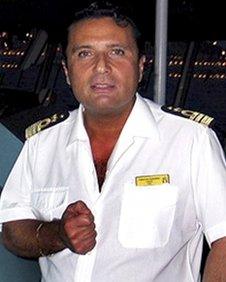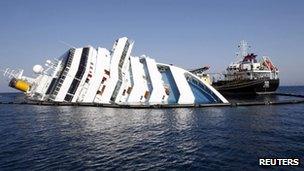Concordia hearing: Scapegoat fears for captain Schettino
- Published

Captain Francesco Schettino's lawyer says he saved 2,000 lives
Ahead of the pre-trial hearing, Costa Concordia captain Francesco Schettino was said by his family to be both depressed and afraid.
His brother-in-law, Maurilio Russo, said the captain was suffering in the knowledge that lives had been lost and was particularly affected by the death of the youngest victim, five-year-old Dayana Arlotti.
"He's not a monster, he is a good person," Mr Russo told the BBC.
"He is depressed. He's obviously scared. This has become a media trial."
One of the Mr Schettino's lawyers, Paolo Bastianini, believes the black box and other evidence that is about to be reviewed will eventually cast the captain's actions in a better light.
"We feel confident that this technical investigation will confirm what Commander Schettino has been saying," he said.
"For example, that the ship didn't end up where it is randomly, but that it was him who took it there."
Mr Bastianini was referring to the fact that the vessel had not gone down in deep water.
Mr Schettino argues that after hitting the reef, he deliberately and skilfully steered his sinking ship to within a few metres of the rocky coast of the island of Giglio, making it easier for his passengers to get ashore safely.
"By doing that, he saved the lives of a couple of thousand people," said Mr Bastianini.
'Scapegoat'
Initially only Mr Schettino and his first officer, Ciro Ambrosio, were formally under investigation. But last week several others were also named.

The Costa Concordia hit a reef and sank in January 2012
Among them were more of the ship's officers, and two senior figures from its operating company, Costa Cruises.
These are the firm's vice-president, Manfred Ursprunger, and the head of its crisis management unit, Roberto Ferrarini.
Both men were onshore on the night of the disaster and decisions they took as it unfolded are now officially under scrutiny.
This development has pleased the captain's lawyers.
"We had been saying that the investigation had to be broadened and that Schettino couldn't be the only scapegoat," said Mr Bastianini.
"Schettino assumes his responsibilities, but he is not the only one. He isn't the monster of the story."
But the prosecution's case puts most of the blame for what happened firmly on Mr Schettino's shoulders.
It says he simply sailed his huge vessel too close to Giglio in what was intended to be a kind of salute to the islanders.
He then allegedly failed to take proper charge of the situation as the crisis deepened and abandoned his passengers to save himself.
On top of all this there have been persistent suggestions that the captain may have been distracted at the moment of the collision by the presence on the bridge of a young woman from Moldova, Domnica Cemortan.
In a recent newspaper interview she admitted being attracted to Mr Schettino, who is married.
She said she believes they were on the point of starting an affair, but insisted that she was not in any way to blame for what happened off Giglio.